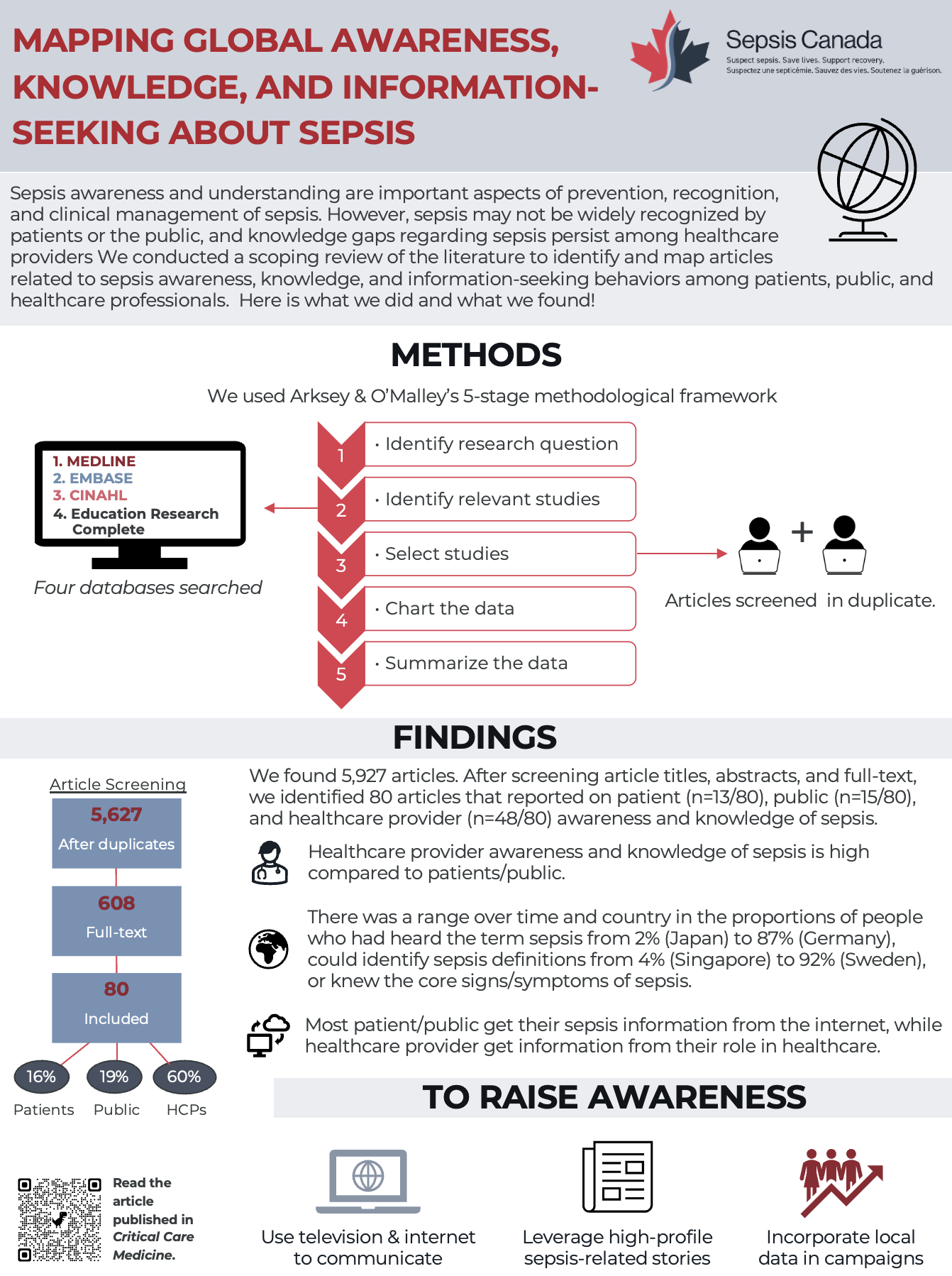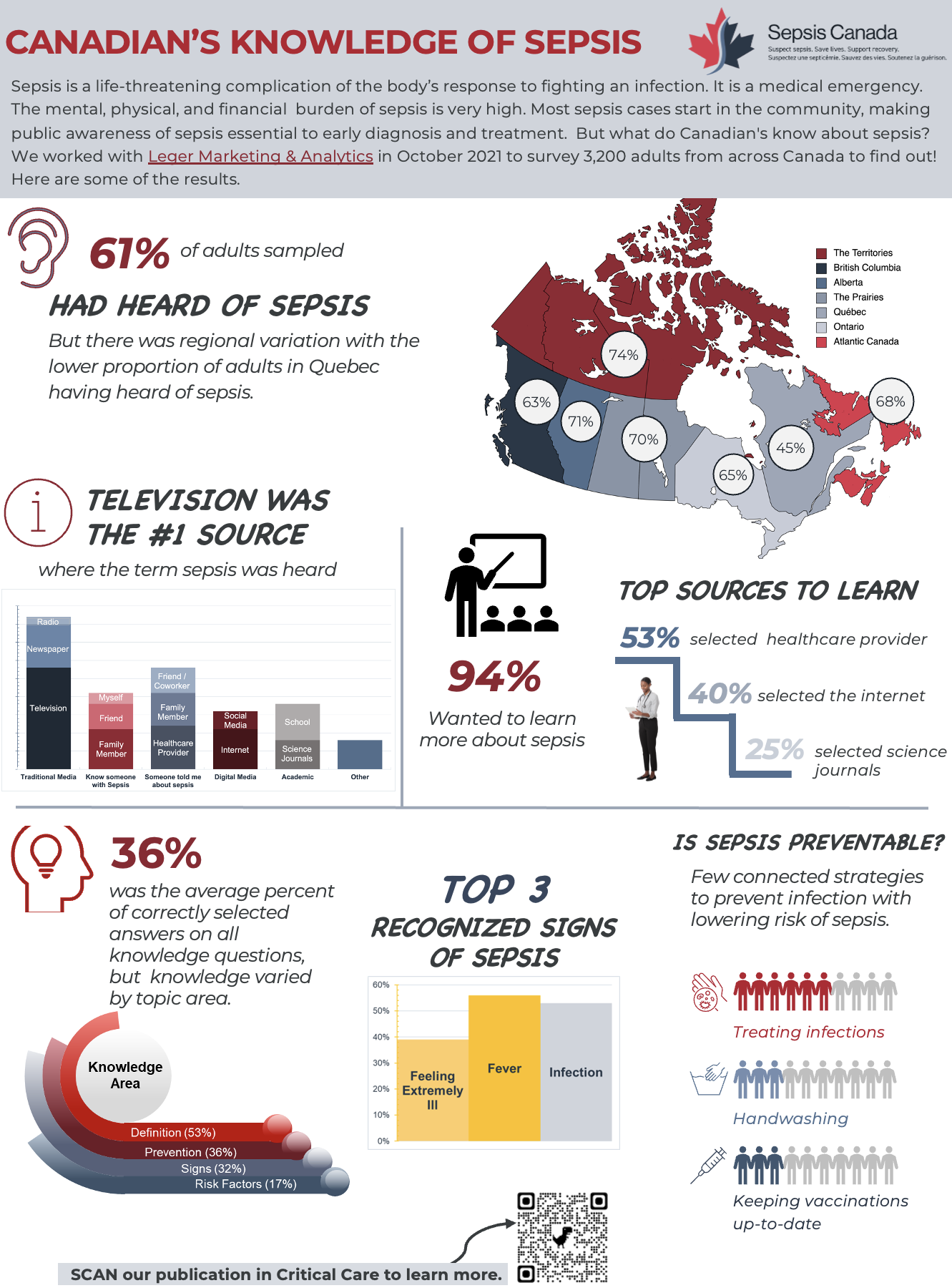Creating a culture of sepsis awareness through advocacy, health literacy and knowledge translation
Sepsis is a medical complication of the body’s response to fighting an infection. Sepsis can very quickly lead to organ damage and death if not recognized and treated early. Globally public awareness of sepsis is generally low, but we do not know what people living in Canada know about sepsis. This 5-year study aims to assess sepsis awareness and knowledge in Canada, identify major knowledge gaps, and address these gaps with the end-goal to improve sepsis literacy. We will apply a multi-phased, mixed method study design involving national surveys, focus groups, and the development a national campaign to engage, educate, and empower the public to be able to make informed decisions about their health.
Introducing the Sepsis Project What is Sepsis
This project is led by two exemplary scientists, Dr. Jeanna Parsons Leigh, Associate Professor in the School of Health Administration at Dalhousie University and Killam Memorial Research Chair, and Dr. Kirsten Fiest, Associate Professor in the Department of Critical Care and Director of the O’Brien Institute for Public Health, University of Calgary. The project is a collaboration of many researchers, patient and family partners, and healthcare providers. The day-to-day work is supported by a small but mighty squad of research staff and patient partners. For more information, please contact the coordinator, Rebecca

We are applying a multi-phased approach to data collection that incorporates surveys, focus groups, interviews, and quasi-experimental study designs.
Survey methods are useful in describing the knowledge, attitudes, beliefs, perceptions, and characteristics of a large and diverse population. They will provide a snapshot of the public’s understanding of sepsis (what is sepsis, how does someone get it, signs and symptoms, its course, its treatment). We also will be able to examine if people have a different understanding of sepsis and different information needs based on their gender, age, education, income, or ethnic or cultural background.
Focus groups and interviews will help us examine in greater detail what the public understands about sepsis as well as how they access information about health conditions in general, including sources most trusted. Our understanding will include sociocultural factors that may impact the public’s access, comprehension, and use of health information on sepsis.
The data we collect will inform a multi-component and adaptable campaign to address key gaps in recognizing and responding to signs of sepsis.
This project is part of the work of Sepsis Canada, a multidisciplinary research network working toward reducing the burden of sepsis for all Canadians. Sepsis Canada is funded by a grant from the Canadian Institutes of Health Research.
Overview
Sepsis is a medical complication of the body’s response to fighting an infection. Sepsis can very quickly lead to organ damage and death if not recognized and treated early. Globally public awareness of sepsis is generally low, but we do not know what people living in Canada know about sepsis. This 5-year study aims to assess sepsis awareness and knowledge in Canada, identify major knowledge gaps, and address these gaps with the end-goal to improve sepsis literacy. We will apply a multi-phased, mixed method study design involving national surveys, focus groups, and the development a national campaign to engage, educate, and empower the public to be able to make informed decisions about their health.
Introducing the Sepsis Project What is Sepsis
Team
This project is led by two exemplary scientists, Dr. Jeanna Parsons Leigh, Associate Professor in the School of Health Administration at Dalhousie University and Killam Memorial Research Chair, and Dr. Kirsten Fiest, Associate Professor in the Department of Critical Care and Director of the O’Brien Institute for Public Health, University of Calgary. The project is a collaboration of many researchers, patient and family partners, and healthcare providers. The day-to-day work is supported by a small but mighty squad of research staff and patient partners. For more information, please contact the coordinator, Rebecca

Methods
We are applying a multi-phased approach to data collection that incorporates surveys, focus groups, interviews, and quasi-experimental study designs.
Survey methods are useful in describing the knowledge, attitudes, beliefs, perceptions, and characteristics of a large and diverse population. They will provide a snapshot of the public’s understanding of sepsis (what is sepsis, how does someone get it, signs and symptoms, its course, its treatment). We also will be able to examine if people have a different understanding of sepsis and different information needs based on their gender, age, education, income, or ethnic or cultural background.
Focus groups and interviews will help us examine in greater detail what the public understands about sepsis as well as how they access information about health conditions in general, including sources most trusted. Our understanding will include sociocultural factors that may impact the public’s access, comprehension, and use of health information on sepsis.
The data we collect will inform a multi-component and adaptable campaign to address key gaps in recognizing and responding to signs of sepsis.
Funding
This project is part of the work of Sepsis Canada, a multidisciplinary research network working toward reducing the burden of sepsis for all Canadians. Sepsis Canada is funded by a grant from the Canadian Institutes of Health Research.
Research |
|---|
We are currently working on developing communication interventions to build a public sepsis awareness campaign. A compelling campaign can help convey the seriousness of sepsis and encourage people to learn more about its signs and symptoms. This work is built on our multi-phased study design consisting of evidence synthesis, survey, and focus groups. Continue to check back for details on our progress developing sepsis communication interventions!
Evidence Synthesis |
|---|
This study describes a scoping review we conducted to identify and map the literature related to sepsis awareness, general knowledge, and information-seeking behaviors.
Publication
Critical Care Medicine 50(8):p 1187-1197, August 2022
Video Shorts
EnglishFrench
Survey |
|---|
This study describes the results of Canada’s first national survey of adults to assess awareness and knowledge of sepsis.
Publication
Public Awareness and Knowledge of Sepsis: across-sectional survey of adults in Canada
Critical Care 26 (337): November 2022
Video Shorts
Who has heard of Sepsis?What do Canadians know about Sepsis?
Focus Group |
|---|
This study builds on our scoping review and national survey by exploring the experiences of persons with lived experiences of sepsis using a qualitative descriptive study design.
Infographic
Forthcoming
Video Shorts
Forthcoming
1. Key Messges to Cummunicate to the Public
2. Uncovering Barriers to Sepsis Knowledge
News and Events |
|---|





